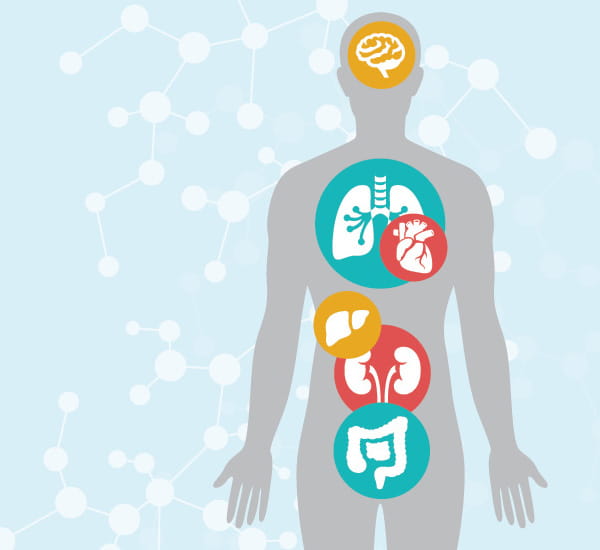Hereditary breast and ovarian cancer
A change in certain genes is associated with hereditary breast and ovarian cancer (HBOC), which can increase your risk of developing certain cancers.
What is hereditary breast and ovarian cancer?
Hereditary breast and ovarian cancer syndrome (HBOC) is an inherited condition. When you have a change in the BRCA1 or BRCA2 genes, it can lead to an increased risk of developing certain cancers including:• Breast cancer
• Male breast cancer
• Melanoma
• Ovarian cancer
• Pancreatic cancer
• Prostate cancer
BRCA1 and BRCA2 gene changes
Both the BRCA1 and BRCA2 genes are called “tumor suppressor genes,” meaning they typically stop cancer cells from growing out of control. When these genes aren’t working like they should, cells in certain parts of the body are more likely to grow.Understanding your risk
• Female breast cancer: 12%
• Male breast cancer: .1%
• Ovarian cancer: 1.3%
• Pancreatic cancer: 1.5%
• Prostate cancer: 15%
• Melanoma: 2%
• Female breast cancer: 55 - 65%
• Male breast cancer: 1 - 2%
• Ovarian cancer: 39%
• Pancreatic cancer: 1 - 3%
• Prostate cancer: <30%
• Female breast cancer: 45%
• Male breast cancer: 5 - 10%
• Ovarian cancer: 11 - 17%
• Pancreatic cancer: Up to 7%
• Prostate cancer: <39%
• Melanoma: 5%
Living with HBOC
If you’ve been diagnosed with HBOC, regular cancer screening and prevention, for women and men, are key to minimizing your cancer risk. Healthy habits such as maintaining a healthy weight, getting regular exercise and minimizing alcohol consumption are also important.
Getting regular cancer screenings, for women and men, are also key to prevention. These guidelines change, so talk with your doctors about your specific genetic risk.
For women:
- Breast self-awareness and breast self-exams should start at age 18 and be repeated regularly.
- Clinical breast exams should start at age 25 and be repeated every 6 to12 months.
- Annual breast MRIs should begin at age 25.
- Annual mammograms should begin at age 30.
- Surgery to remove ovaries is an option to consider at around 35 to 40 years old, after having kids.
- Medications to reduce the risk of breast cancer are options to consider.
- Surgery to remove breast tissue is an option to consider.
For men:
- Breast self-awareness and breast self-exams should start at age 35.
- Annual clinical breast exams should start at age 35.
- Annual prostate screening should start at age 40.
What does this mean for my family?
If you’ve been diagnosed with HBOC syndrome, your blood-related family members may have it, too. We strongly encourage you to share this information with your close blood relatives.
Your children and siblings each have a 50 percent chance to have the same genetic change. More distant relatives may also be at risk. At-risk family members can learn if they have the same genetic risk by getting a genetic test. A genetic counselor or doctor can arrange for testing. And most insurance companies will pay for this testing.
Find a provider
Some Geisinger doctors specialize in helping people with BRCA1 and BRCA2 gene changes develop a screening and management plan. A few doctors you may consider visiting include:
- Primary care providers.
- Specialists in Geisinger’s Inherited Risk Breast Clinic: This clinic is designed especially for people with BRCA1 and BRCA2 genetic changes. If you have any questions, call our cancer genetics department at 570-214-2637 and ask to speak to a genetic counselor.
- If you're female, a gynecologic oncologist can discuss removal of your ovaries (after the age of 35 and when you're finished having children).
- If you're male, consider meeting with a urologic oncologist.

